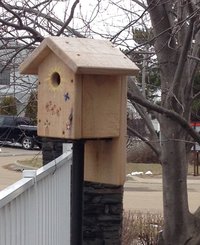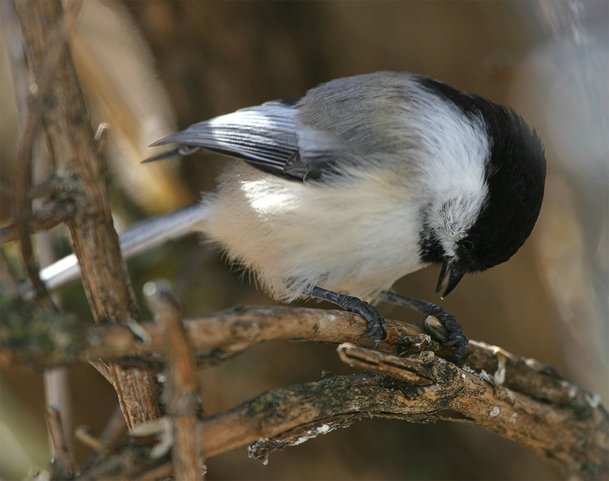 My new chickadee box, already occupied
My new chickadee box, already occupied Chickadees are year-round residents in Edmonton and not shy around humans. They start looking for nesting sites in March and April.
Black-capped Chickadees are cavity nesters and therefore, they look for holes in trees or rotten areas they can excavate. In cities, they also use nesting boxes attached to a fence post or tree 1 to 3 m above ground. The key to their success is a small enough entrance hole to keep out invasive House Sparrows. The entrance hole should be 29 mm or 1 1/8 inch diameter maximum.
By late April, the female is ready to lay eggs, usually 6-8. She incubates the eggs for periods of 20-30 minutes, and the entire night, for about two weeks. Between incubation periods, she goes looking for food and the male also feeds her while she’s on the nest.
Chickadees are a very important pest control in our yards. They are voracious predators of caterpillars and other insects, mostly on trees and shrubs. They pick off insects from the bark and leaves. They seem to use leaf damage as clues to where pests are hiding. How cool is that?!
Animal matter provides them with about 80% of their diet. Fruit and seeds are also important, especially during the winter and breeding season, when they need lots of calories. Putting out sunflowers seeds and growing sunflowers attract them to your yard.
You can get excellent advice and supplies at Wildbird General Store or Wild Birds Unlimited. Be sure to purchase a box that has a small hole that excludes House Sparrows because these invaders will take over and eat your prized veggie seedlings.
To build your own box, you can find plans here.
Find more info about the importance of birds in organic food production.
And here are more facts on Black-Capped Chickadees and other Canadian wildlife.

 RSS Feed
RSS Feed